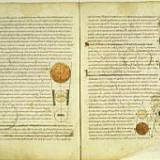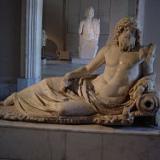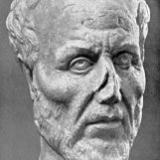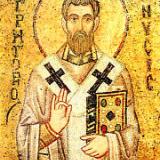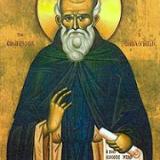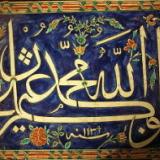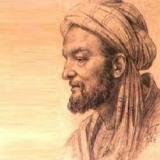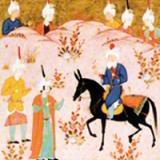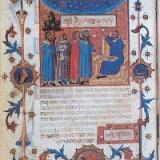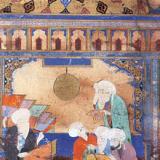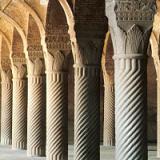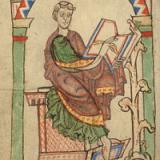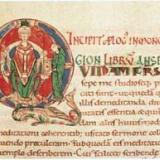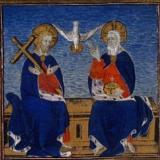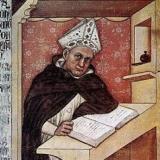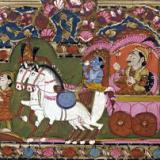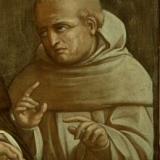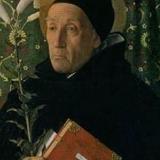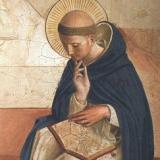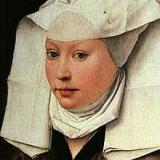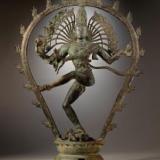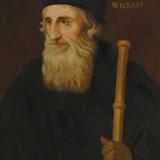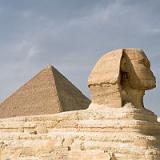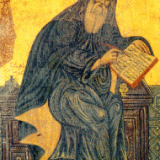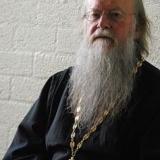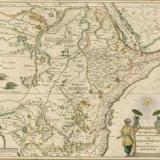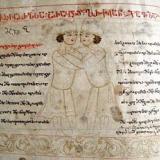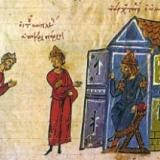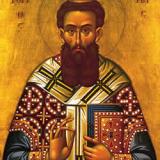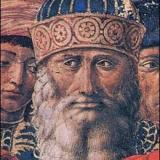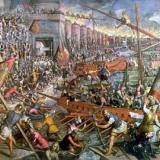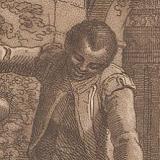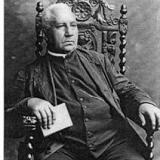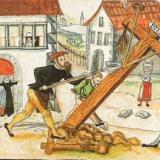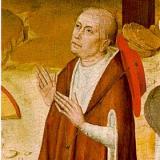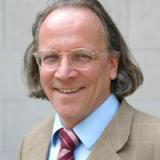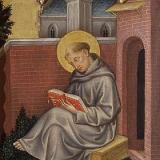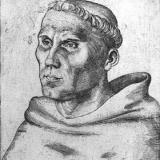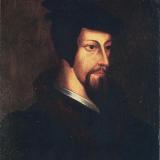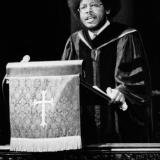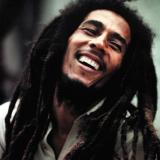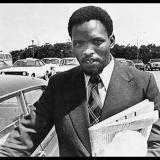God(s)
Posted on
Peter looks at Plato's Timaeus, focusing on the divine craftsman or demiurge, the receptacle, and the geometrical atomism of Plato's elemental theory.
Posted on
Drawing on the De Anima, On the Heavens, Physics and Metaphysics, Peter tackles Aristotle’s theory of mind and its relation to his theology.
Posted on
Peter considers Epicurus’ attempt to dispel the fear of death and the gods, and along the way looks at the topics of soul, atheism, and philosophy as therapy.
Posted on
Peter looks at the Stoic idea of god, a providential fire that pervades nature, and considers their idea of a deterministic and eternally recurring cosmos.
Posted on
Plotinus posits an absolutely transcendent first principle, the One. What is it (or isn’t it), and how does it relate to Intellect?
Posted on
Basil of Caesarea, his brother Gregory of Nyssa, and Gregory of Nazianzus use philosophy to help the poor and to defeat their theological opponents.
Posted on
Maximus the Confessor brings us to the brink of the medieval Byzantine period with his philosophical defense of Christ’s full divinity and full humanity.
Posted on
A first look at the philosophical contributions of Islamic theology (kalām) and its political context, focusing on the Mu'tazilites Abū l-Hudhayl and al-Naẓẓām.
Posted on
Al-Ash'arī puts his stamp on the future of Islamic theology by emphasizing God’s untrammeled power and freedom.
Posted on
Avicenna’s proof of the Necessary Existent is ingenious and influential; but does it amount to a proof of God’s existence?
Posted on
Sufism, the mystical tradition of Islam, unites with philosophy in the work of Ibn 'Arabī.
Posted on
Peter tests different approaches to interpreting Maimonides, focusing on his discussion of the eternity of the world, which tries to settle the debate by declaring a draw.
Posted on
The hugely influential Fakhr al-Dīn al-Rāzī weaves Avicenna and Islamic theology into complex dialectical treatments of time, God, the soul, and ethics.
Posted on
Suhrawardī, founder of the Illuminationist (ishrāqī) tradition, proposes a metaphysics of light on the basis of his theory of knowledge by presence.
Posted on
Naṣīr al-Dīn al-Ṭūsī’s controversial career sees him adopt and then abandon Ismā'īlism, team up with the Mongols, and offer a staunch defense of Avicenna.
Posted on
Ill-tempered debates in early modern Iran, as we examine the rivalry between Dawānī and the Dashtakīs at Shīrāz.
Posted on
Anselm offers more than his famous ontological argument, including a subtle account of human freedom.
Posted on
The most famous argument in medieval philosophy is Anselm’s proof for the existence of God. But how was it supposed to work?
Posted on
Discussion, debate and denunciation of philosophical attempts to explain the Trinity in Abelard, Richard of St Victor and Bernard of Clairvaux.
Posted on
Albert the Great’s theory of being and his attempt to explain what changes in the human mind when we come to see God in the afterlife.
Posted on
The Bhagavad-Gītā or “Song of the Lord” from the Mahābhārata ties its theory of detached action to an innovative conception of the divine.
Posted on
Medieval discussions of the Trinity charted new metaphysical territory, as we see in this interview with Richard Cross.
Posted on
Duns Scotus attacks the proposal of Aquinas and Henry of Ghent that being is subject to analogy.
Posted on
Scotus, Ockham, and Bradwardine ask how we can be free if God knows and chooses the things we will do in the future.
Posted on
The scholastic and mystic Meister Eckhart sets out his daring speculations about God and humankind in both Latin and German.
Posted on
Dietrich of Freiberg, Berthold of Moosburg, John Tauler and Henry Suso explore Neoplatonism and mysticism.
Posted on
Julian of Norwich’s Shewings and the Cloud of Unknowing lay out challenging paths to knowledge of, and union with, God.
Posted on
Philosophy is put into practice in Kashmir Śaivite Tantra and Buddhist Tantra.
Posted on
John Wyclif refutes nominalism and inspires the Lollard movement, which anticipated Reformation thought with its critique of the church.
Posted on
Peter King, Catarina Dutilh Novaes, and Russ Friedman discuss their approaches to medieval philosophy and its contemporary relevance.
Posted on
Ancient Egyptian figures and writings including the Pyramid Texts, Imhotep, and the "first monotheist" Akhenaten reflect on the nature of things and questions of morality.
Posted on
John of Damascus helps to shape the Byzantine understanding of humankind and the veneration of images, despite living in Islamic territory.
Posted on
Peter is joined by Andrew Louth for a discussion of John of Damascus and his theological use of philosophy.
Posted on
The 17th century Ethiopian rationalist Zera Yacob, hailed as the first modern Africana philosopher.
Posted on
Is traditional African religion in some sense monotheist, despite the worship of many divinities?
Posted on
The Neoplatonist Proclus gets mixed reviews from Christians, as Nicholas of Methone refutes him but the Georgian philosopher Ioane Petritsi helps to revive his thought.
Posted on
Intellectual exchange between Christians and Muslims, and the later flowering of Syriac literature including the philosopher Bar Hebraeus.
Posted on
Gregory Palamas and the controversy over his teaching that we can go beyond human reason by grasping God through his activities or “energies”.
Posted on
Was Gemistos Plethon, the last great thinker of the Byzantine tradition, a secret pagan or just a Christian with an unusual enthusiasm for Platonism?
Posted on
When the Byzantine empire ended in 1453, philosophy in Greek did not end with it. In this episode we bring the story up to the 20th century.
Posted on
Quobna Ottobah Cugoano and Olaudah Equiano advance the goals of the abolitionist movement through a groundbreaking political treatise and an influential autobiography.
Posted on
A late 19th-century churchman tries to explain how slavery fit into God’s plan and decide whether the future for African Americans lies in Africa or America.
Posted on
How humanism and scholasticism came together with the Protestant Reformation to create the philosophy of 15 - 16th century Europe.
Posted on
The radical negative theology of Nicholas of Cusa, and his hope of establishing peace between the religions of the world.
Posted on
Learned ignorance, coincidence of opposites and religious peace: Paul Richard Blum discusses the central ideas of Nicholas Cusanus.
Posted on
Trends in Aristotelian philosophy in northern and eastern Europe in the fifteenth century, featuring discussion of the “Wegestreit” and the nominalist theology of Gabriel Biel.
Posted on
How Luther’s doctrine of justification by faith alone and his attack on the Church relate to the history of philosophy.
Posted on
John Calvin's views on predestination and the limits of human reason.
Posted on
After Albert Cleage and James Cone propose a liberatory interpretation of Christianity, William R. Jones wonders whether God is a white racist. We also follow Black Theology among “Womanist” authors and in South Africa.
Posted on
How the Rastafari movement grew from trends within Africana philosophy, and then passed into global popular culture in the music of Bob Marley and other reggae artists.
Posted on
Famous for his killing at the hands of the Apartheid government in South Africa, Steve Biko was also a deep thinker, who introduced the notion of Black Consciousness.

